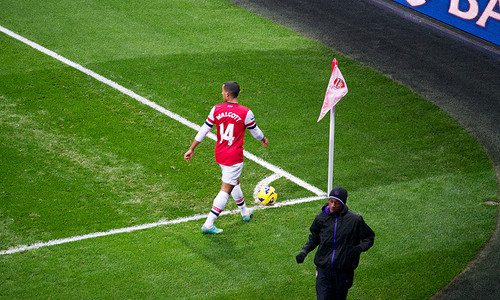Southampton offer beacon of hope for English football
Sven-Göran Eriksson’s ‘golden generation’ of 2002 are now a thing of the past, and many are questioning the ability of England’s current crop of stars to emulate their predecessors’ success.
In stark contrast to David Beckham, Michael Owen and Steven Gerrard – all stellar names in world football – the likes of Alex Oxlade-Chamberlain, Danny Welbeck and Chris Smalling are struggling to just retain a place in their domestic club’s starting XI.
Despite this, they are perceived as the future of English football.
What has gone wrong? How can England’s pool of talent experience such a decline over just one generation? No longer are England fans enthusing about the chances of ‘football coming home’ in the next World Cup. Instead, the country frets over England’s ability to merely qualify for the next major tournament.
The answer, at least to some extent, surely lies in the reluctance of the Premier League’s finest to blood young English talent in their teams.
Of all the minutes played in Premier League football so far this season, only 32.26 % are English, according to the worrying State of the Game report published last week. This statistic is particularly concerning when compared with the two international powerhouses Spain and Germany, whose homegrown talents represent 50% and 59% of the minutes respectively.
Some maintain that this is the strength of the Premier League, rather than its weakness. An influx of talent from abroad has dramatically increased the quality of play in England’s top division, although this may be to the detriment of the national team. When young English players have their pathway to the first team blocked by talented foreign imports, there will inevitably be less English footballers plying their trade at the highest level.
However, this trend can be overcome. F.C. Barçelona’s La Masia academy are renowned for unearthing some of world football’s most talented young players. Current graduates from La Masia include Lionel Messi, Andrés Iniesta, and Xavi.
In 2010, this trio were recognised as the top three players in world football respectively. Also included in La Masia’s current generation are World Cup winners Víctor Valdés, Carles Puyol, and Sergio Busquets, amongst others.
On the other side of the spectrum, Manchester City currently only boast one academy product who features regularly for England – and that is Liverpool’s Daniel Sturridge. Since Sheikh Mansour’s takeover of the club in 2008, City have ostensibly neglected young English talent.
This summer alone, Manchester City spent upwards of £100m on new players. While some fans will argue that this is a necessity in order to retain their place at the top of the Premier League, other English teams have suggested otherwise. Perhaps success and high-profile transfers can be compatible with a strong emphasis on youth policy.
Southampton, for example, had an expensive summer. The Saints spent close to £35m in the transfer window, outstripping everyone outside the traditional top six. However, Southampton were able to show us that marquee signings can play alongside products of the academy system, rather than replacing them.
Summer acquisitions Dani Osvaldo, Victor Wanyama and Dejan Lovren have given the side an assured and technically-adept look, but as Southampton lined up to face West Brom on the opening day of this season’s Premiership, no fewer than three 18-year-olds graced their starting XI: defenders Luke Shaw and Calum Chambers, and midfielder James Ward-Prowse. This is in addition to academy product Adam Lallana captaining the side.
Pundit Alan Hansen infamously once said “you can’t win anything with kids”. Southampton though are firmly on course to disprove this theory. It is possibly their very reliance on youth that sees them lurking in fourth place going into the international break.
Indeed, Southampton have won their last three games, including a superb 1-0 win at Anfield. The hybrid of youth and experience is working.
The Saints have traditionally provided some of the best British footballers. Had they denied Theo Walcott, Gareth Bale and Oxlaide-Chamberlain first-team opportunities, perhaps they would never have developed into the accomplished and exciting talents that they are.
There seems to be a fear among some top teams that focusing on the success of tomorrow can hinder the success of today. However, there is an equilibrium to be found.
The likes of Manchester City, with their over-reliance on expensive foreign imports, could be doing more for English football. On the other hand, it has been argued that Arsene Wenger is too trusting in youth at Arsenal, given the club’s eight-year spell without winning silverware.
If the Premier League can find an equilibrium by allowing young players to develop alongside experienced professionals, hopefully England can become an international force to be feared once more.

Comments (1)
Never have I seen such a bias article, the writer is clearly a Southampton fan